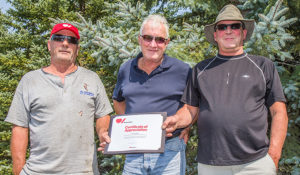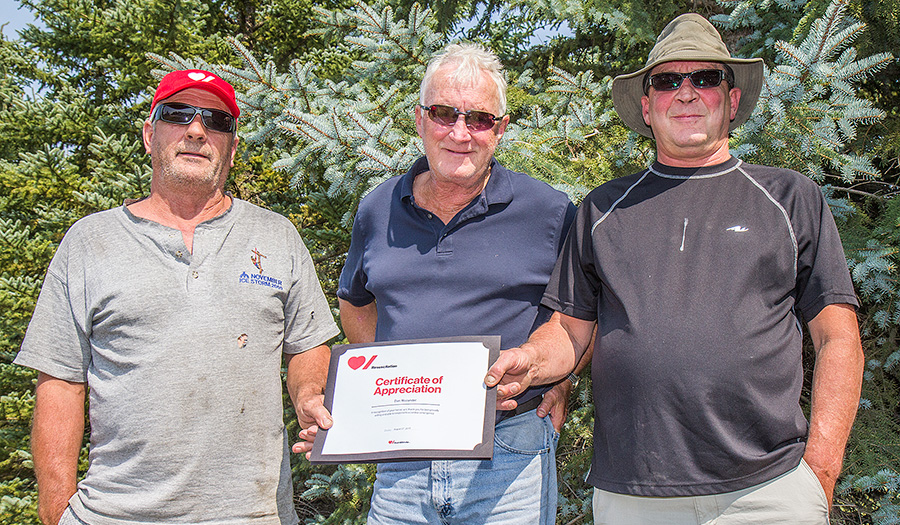
Three Killarney men awarded for life saving actions in May 2016
BY KIM LANGEN
When Geoff Chandler was busy making up sandwiches on a May morning last year, he had no idea of the eventful day ahead of him.
Within a few hours, Chandler, a retired diagnostic supervisor at Killarney hospital, was to suffer a life-altering event, and barely make it home alive.
It would happen on the shores of Rock Lake, in the company of his hunting and fishing buddies. He would fall face first into wet cement, as a massive heart attack overcame him.
But he would live to tell the tale – thanks to the skills of those friends: Paul Jones, Dan Rozander, and Dan’s son Eddie.
“Paul phoned me that morning, to ask me if I would be interested in giving him a hand, out at Rock Lake,” said Chandler. “He was going out there to work on a job, pouring a cement pad for the Rock Lake Store. We were just about finished; I might have been raking the cement. I had told him earlier that I was feeling a little bit sick, and he said we were almost done. They told me afterwards that suddenly I just went completely still, my mouth and my eyes were wide open, and I just fell forward, face first into the cement. The only part of that day I remember now is making sandwiches, and the Pugh’s truck coming in with the cement.”
In fact, Chandler’s two coronary arteries, which supply the heart, had become 90 to 95 per cent blocked, causing a major cardiac event.
“It was just one of those things that happened,” he said. “I had no idea, and no real symptoms, and there was no cardiac history in our family. I learned later that I had undiagnosed coronary artery disease, or CAD.”
Luckily for Chandler, his buddies shared a common background in first aid.
They pulled him out of the wet cement, which had filled his eyes and mouth, and cleaned him up. Paul Jones got as much of the caustic mortar out of Chandler’s right eye as he could.
They checked for a pulse, and then realized that Chandler’s heart had stopped.
And that’s when their training clicked in.
“Paul and Eddie took it in turns to do CPR compressions, for 15 to 20 minutes, and Dan did the breathing,” said Chandler. “At one point Paul realized he was breaking my ribs, and he stopped. But they told him to keep going, because if he didn’t, I would die anyways. I had seven broken ribs. And I have a burn mark right here on my sternum where Paul was compressing, because he had cement on his hands.”
But Chandler’s heart was still not beating.
That’s when modern technology played a role, involving a portable life-saving unit that costs around $1,500 to $1,700.
“The storeowner brought up the AED (automated electronic defibrillator) that was in the Rock Lake Store,” said Chandler. “Dan operated it. He said they shocked me three times to get my heart going. The AED told him what to do, and he did it. It saved my life.”
Then the EMS arrived, and transported him by ambulance to Crystal City, said Chandler.
STARS took over from there, using a helicopter to pick him up, and fly him to the emergency department of St. Boniface Hospital in Winnipeg.
“That’s where they did a CT scan on my head, to see if there was any activity,” said Chandler. “I guess there was a little. They didn’t know how long my brain had been short of oxygen. I woke up in St. Boniface, and the doctor told me he had no idea how I was still alive, and why I had no brain damage. They told me I was a very lucky man. I went in there on a Monday, but I can’t remember anything until the Wednesday. I had to see the ophthalmologist about four times, and I have the sight back in my right eye. The only real change is I have problems now with my short term memory, and I tend to repeat things.”
So how did his pals gain their knowledge?
It turns out that all three of them learned their first response skills in the workplace.
“Paul is in the construction industry, and he has to know CPR,” said Chandler. “Dan was with Manitoba Hydro, and they trained him in CPR. Eddie was in the oilfield services, and he knew it too. If I had been anywhere else, I would be dead. It was those guys who saved me. I am grateful, but I can’t keep saying it every day. And they don’t want to hear it. So I still give them the same bad time that I used to.”
In fact, all the men avoid discussing the event, he said – even over a beer.
“The guys don’t want to talk about it,” said Chandler. “It’s hard on them. We don’t talk about it.”
But, evidently, other people have heard the remarkable story, and have been sharing it.
And this past summer Paul Jones, Eddie Rozander, and Dan Rozander were awarded by the Manitoba Heart and Stroke Foundation for their actions on May 9, 2016, at Rock Lake.
At a ceremony on August 27 at The Forks, in Winnipeg, during an in-service training seminar for the public in the use of AEDs, the trio was applauded for saving Chandler’s life.
Fire and Paramedic Chief for Winnipeg, John Land, presented them with certificates of appreciation.
With around 700 people listening to the story, Land acknowledged the trio’s live-saving skills in providing CPR, and the use of an AED to a cardiac victim, who successfully survived the event in a remote location, thanks to their efforts.
“We all teared up,” said Chandler. “This was beyond their comfort zone.”
Since the heart attack, Chandler has had surgery to put in two stents for his heart.
The stents were continually plugging up, however, and not working well. So in the fall of 2016 he underwent triple bypass surgery.
“That’s about as afraid as I have been in my life,” said Chandler. “They told me to take a very deep breath before they began. I wondered if it would be my last one.”
These days he has returned to work at the local hospital, on a casual basis, as an x-ray technologist, and doing EKGs.
And he has plans for him and the buddies.
“I’m still fishing, and I want to go hunting with the guys this fall,” he said. “We like to go bird hunting around here. I haven’t been back to the cement pad at Rock Lake, and I don’t plan to. And we don’t talk about that day. But I would like to see the guys in the paper, with their certificates, and let people know how important AEDs are, and the skill of CPR. Eighty-five per cent of heart attacks happen outside of a hospital. It is amazing that I was outside, in these conditions, and 20 minutes from a community, and I survived.”
AEDs (Automated Electronic defibrillators) are currently located in a number of Killarney buildings – including The Shamrock Centre; next to RBC in the Killarney Place mall; Pugh’s Sand and Gravel; Killarney Lakeside Golf Course; and the Co-op Food Store.
If we missed you, contact The Guide with the location of your premises, which also provides an emergency AED.

CALLING FOR MORE DEFIBRILLATORS – From left, Dan Rozander, Geoff Chandler, and Paul Jones of Killarney would like to see more AEDs, or Automated Electronic Defibrillators, made available to the public. In May of 2016, Jones and Rozander, along with his son Eddie (not in photo), used CPR and an AED to save Chandler’s life at Rock Lake, after Chandler’s heart stopped beating. The three were recently awarded by the MB Heart and Stroke Foundation with certificates for their actions.
KIM LANGEN/KILLARNEY GUIDE

